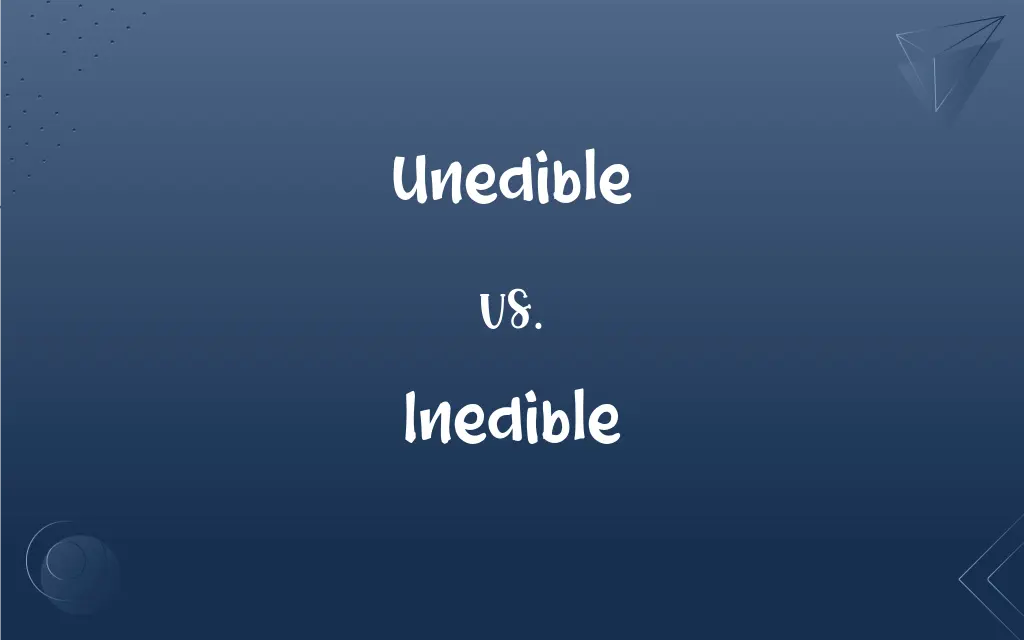Unedible vs. Inedible: What's the Difference?
Edited by Harlon Moss || By Janet White || Updated on October 3, 2023
"Unedible" and "Inedible" both refer to something that cannot be eaten, but "Inedible" is the more standard and widely accepted term.

Key Differences
"Unedible" and "Inedible" are both adjectives describing items that aren't suitable for consumption.
The term "Unedible" is less common in the English language and might be considered a less conventional way to describe something that cannot be eaten.
On the other hand, "Inedible" is a standard term that is widely recognized and used in both spoken and written English. Both words have the prefix "un-" and "in-", respectively, which denote negation.
While the usage of "Inedible" is straightforward and accepted in various contexts like culinary arts, medicine, and general conversations, "Unedible" might require further clarification in some contexts because of its lesser usage. One might argue that "Unedible" sounds like something that has become unfit for consumption due to an external factor, while "Inedible" inherently suggests that something was never meant to be eaten.
However, this interpretation isn't strict and can vary among speakers. Ultimately, both terms convey a similar message, but "Inedible" is the preferred choice in most professional and colloquial situations.
ADVERTISEMENT
Comparison Chart
Commonality in Usage
Less common
Standard and widely used
Prefix
Uses "un-", which usually denotes negation
Uses "in-", another form of negation
Perceived Meaning (by some)
Might sound like it was once edible
Inherently never meant to be eaten
Application
Might need clarification in some contexts
Recognized in various contexts
Preferred in Professional Use
Rarely used
Yes, preferred term
ADVERTISEMENT
Unedible and Inedible Definitions
Unedible
Not meant to be eaten, often for safety reasons.
Plastic wrappers are unedible.
Inedible
Not meant for human consumption.
Shoe leather is inedible.
Unedible
Lacking taste or palatability.
The cake, lacking any sugar, was unedible.
Inedible
Not suitable for eating.
Rocks are inedible.
Unedible
Cannot be eaten due to poor quality.
The overcooked pasta was unedible.
Inedible
Harmful or unsafe if consumed.
Certain wild mushrooms are inedible and toxic.
Unedible
Not fit for human consumption.
The spoiled milk was unedible.
Inedible
Beyond a point of acceptable taste or quality for eating.
The burnt toast was inedible.
Unedible
Beyond a point of consumption due to external factors.
After the fire, the food became unedible.
Inedible
Not tasty or palatable.
The dish was so salty, it was inedible.
Unedible
Not edible.
Inedible
Unfit to be eaten; not edible.
Inedible
Not edible; not appropriate, worthy, or safe to eat
Inedible
Anything inedible; that which is not a foodstuff.
Inedible
Not edible; not fit for use as food.
Inedible
Not suitable for food
FAQs
Do both terms mean exactly the same?
Essentially, yes, both describe something that cannot be eaten. But "Inedible" is more standard.
Are there foods that can be both unedible and inedible?
Theoretically, yes, but "Inedible" is the more common descriptor.
Is "Unedible" a valid English word?
Yes, but it's less common than "Inedible."
Why might someone choose "Unedible" over "Inedible"?
Personal preference or regional dialects might play a role.
Which is more widely accepted: Unedible or Inedible?
"Inedible" is the more standard and widely accepted term.
Is "Inedible" used in culinary arts?
Yes, "Inedible" is a term chefs might use to describe non-consumable parts.
Can "Unedible" and "Inedible" be used interchangeably?
Generally, yes, but "Inedible" is preferred.
Is it correct to say "The apple is unedible"?
While it's understood, it's more conventional to say "The apple is inedible".
Can I use "Unedible" in professional writing?
It's better to use "Inedible" in professional contexts.
Can something become unedible over time?
Yes, like food that spoils.
Can inedible items be harmful?
Yes, some inedible items might be toxic or harmful if consumed.
Are all inedible things dangerous to consume?
Not necessarily, some are just not palatable or meant for consumption.
Can you give an example of an "unedible" item?
An overcooked steak that's too tough to eat.
Why is "Inedible" more popular?
It's the standard term in dictionaries and is widely recognized.
Is there any context where "Unedible" is the better choice?
It's rare, but some might use it to emphasize that something was once edible but no longer is.
Is there a noun form for "Inedible"?
Yes, "Inedibility".
What's the antonym of "Inedible"?
Edible.
Can non-food items be described as "Inedible"?
Yes, like plastic or wood.
Are "inedible" plants always toxic?
No, some are just not palatable or nutritious.
If a food tastes bad, can I call it "Unedible"?
You can, but it's more common to say "Inedible" or just that it tastes bad.
About Author
Written by
Janet WhiteJanet White has been an esteemed writer and blogger for Difference Wiki. Holding a Master's degree in Science and Medical Journalism from the prestigious Boston University, she has consistently demonstrated her expertise and passion for her field. When she's not immersed in her work, Janet relishes her time exercising, delving into a good book, and cherishing moments with friends and family.
Edited by
Harlon MossHarlon is a seasoned quality moderator and accomplished content writer for Difference Wiki. An alumnus of the prestigious University of California, he earned his degree in Computer Science. Leveraging his academic background, Harlon brings a meticulous and informed perspective to his work, ensuring content accuracy and excellence.































































